'We all have resilience... You've got to make it grow'
- Published
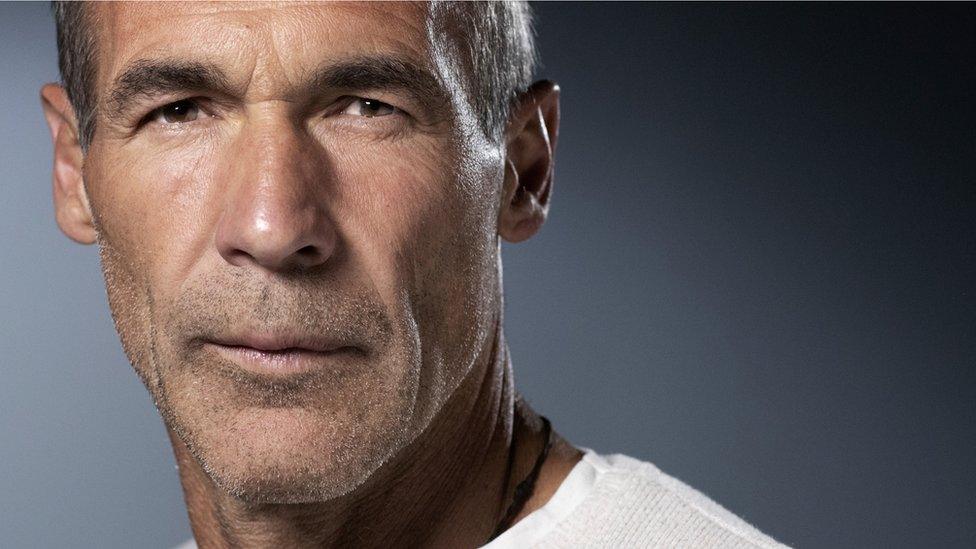
Mike Horn says we can all grow our personal resilience
The BBC's weekly The Boss series profiles different business leaders from around the world. This week we speak to professional explorer and motivational speaker Mike Horn.
"I was bitten by a snake and lost my eyesight, and all the feeling in my face. For five days I couldn't see."
Mike Horn, 53, is talking about his first major solo expedition, back in 1997, when he crossed South America, in part by swimming the length of the Amazon.
The gruelling six-month trip saw him brave rapids, break his knee going over a waterfall, have his equipment stolen by local tribespeople, and get shot at from the banks of the river.
The South African-born adventurer also had to hunt and forage for his food, and became a "host for parasites", having spent lengthy periods in the river. But he says the snakebite was the closest shave.
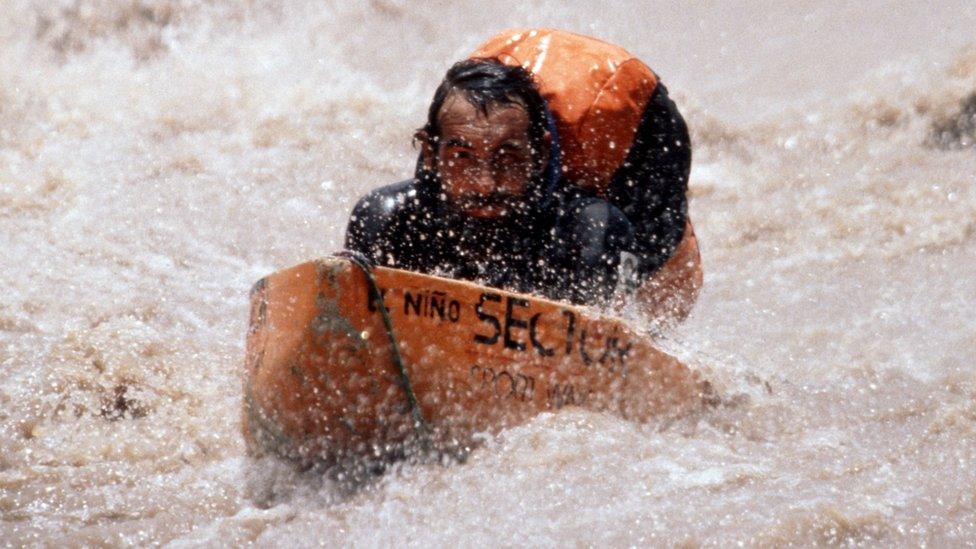
Mike Horn first started going on his big solo adventures back in 1997
"I didn't know I was bitten until I felt the whole world turning in, and I started losing focus," says Mike, who in total travelled 7,000km (4,350 miles) from the Pacific coast of Peru to the Atlantic coast of Brazil.
"At that time I couldn't call back home, all I had was a personal locator beacon with 16 pre-coded messages that I could send to my wife. After three days it became so bad I was going to send the message 'I'm going to die', but I fell unconscious before I managed to push the button."
By the end of the trip Mike realised he wanted to be a professional explorer, and since then he has been on a series of increasingly gruelling adventures that have pushed him to the limit.
They include the first solo circumnavigation of the world around the equator with no engine-driven support in 1999, and becoming joint-first to trek to the North Pole on skis in 2006. He's also built a successful side career as a TV host and motivational speaker.
Mike says he attempted his first expedition aged eight when, without telling anyone, he tried to cycle from his home in Johannesburg to his uncle's farm 300km away.
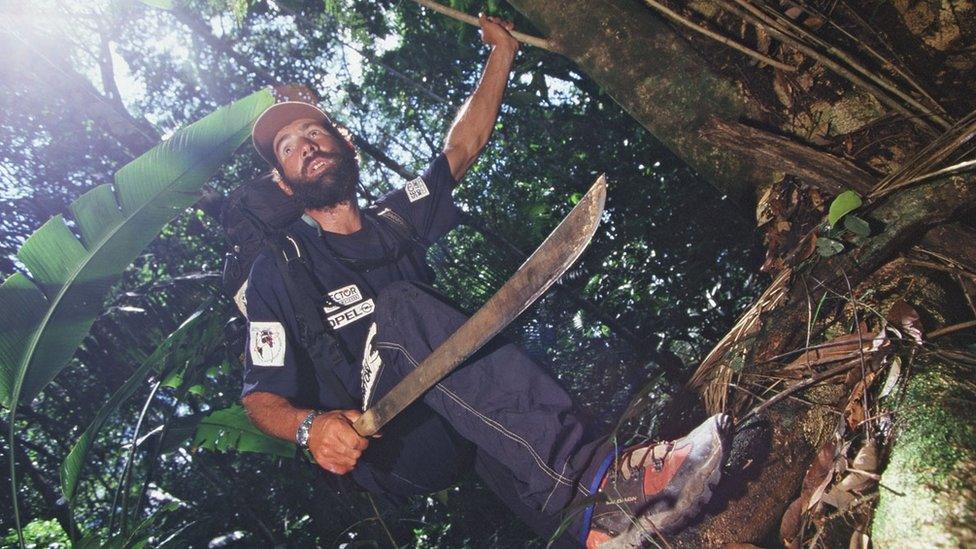
He can spend all but a few days of the year away from home
"I knew it was going to take time, I knew the distances that I could cover, and I was afraid that my dad would say no. But I wanted the freedom to try."
When his father, a successful rugby player, realised what had happened, he drove and picked Mike up on the side of the road.
Dad wasn't angry. "He just said, 'Tell me what you want to do and I can help you'… He always gave me the support to try something out of the ordinary."
After a year of military service with the South African army, fighting in Angola, Mike completed a sports science degree at the University of Stellenbosch. Keen to get out of apartheid-era South Africa, in 1989, at the age of 24, he moved to Switzerland, his home to this day.
There he became ski instructor, but quickly tired of it, and so decided to embark on a series of mini-adventures in Peru. These included, in 1995, river-boarding through the Colca Canyon - one of the world's deepest canyons - where he braved daily avalanches.
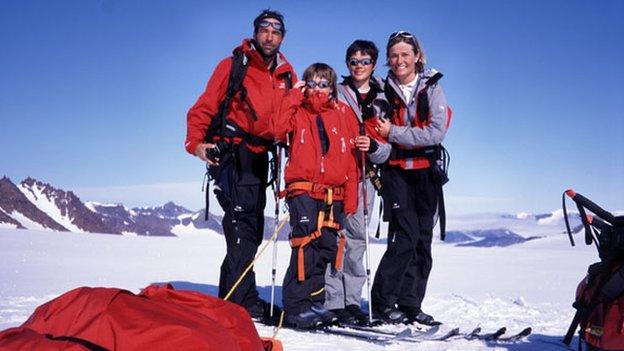
Mike's late wife and their daughters would fly out to see him when he was on his trips
As his trips became more ambitious, sponsors began to take notice, and Mr Horn found a way of funding his adventures. Today he counts a global car brand and a luxury Swiss watch as backers.
His exploring has also led to him writing 11 books, and starring in several TV shows. These included 2016's A L'Etat Sauvage - the French version of the US series Running Wild with Bear Grylls - in which the adventurer takes celebrities on trips with him.
Most of Mike's expeditions have been done solo, with some - such as his 2002 voyage around the Arctic Circle by boat and kayak - lasting a year or more.
He says he "loves the solitude", but admits it was hard on his wife and manager of 20 years, Cathy, who died of breast cancer in 2015. It was also tough on their two daughters, who now run the business he set up in 2007 to manage his eponymous brand.
"There were years when I wasn't home for more than five days," he says, "although I did fly them out for parts of my trips."
Mike has also risked his life more than once. For example, when he revisited the North Pole last year with fellow explorer Boerge Ousland, they crossed 1,800km of treacherous drifting ice on skis in the dark - in the Arctic winter there is no daylight.
Mike got frostbite in his hands, and the explorers almost ran out of food. "I thought I would never come back."
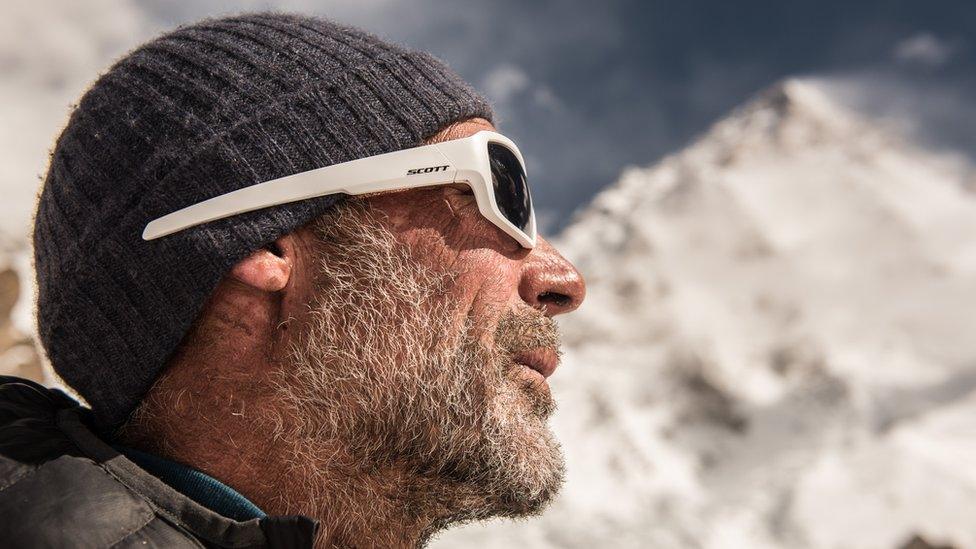
Mike isn't retiring from his day job any time soon
He has channelled such experiences into his work as a motivational speaker and coach, training the likes of the German football squad and big businesses on resilience.
"We all have resilience but we need it more or less depending on what we do in life and our social status… You've got to make it grow."

More The Boss, external features:

He also thinks many of us have too many options, that allow us to "bail out of resilience" and not confront our problems.
"Get rid of all the options, just decide to do one thing," says Mike. "When I go to the North Pole, I know there's no rescue possible.
"There's no other option but to walk and make it. I can't bail out. That is when you become more determined to be able to stand up when you fall."
Mike says he has been slowing down since Cathy died, but his firm still employs five staff - down from 36 at its peak in 2012.
Alistair Gowling, who runs Extreme International, a media company for adventure sports, says the South African adventurer has built his brand well, and helped to "pave the way" for a growing adventure tourism market.
"When [many] people go on holidays now they are looking to try something that drives their adrenalin, and that's largely thanks to people like Mike and Bear Grylls."
The challenge for today's adventurers, adds Mr Gowling, is coming up with new feats of endurance that grab people's increasingly swayable attention. "The world has been explored and it's getting harder to move the needle."
Mike reckons he still has a couple of expeditions left in him, but he worries he is part of dying breed.